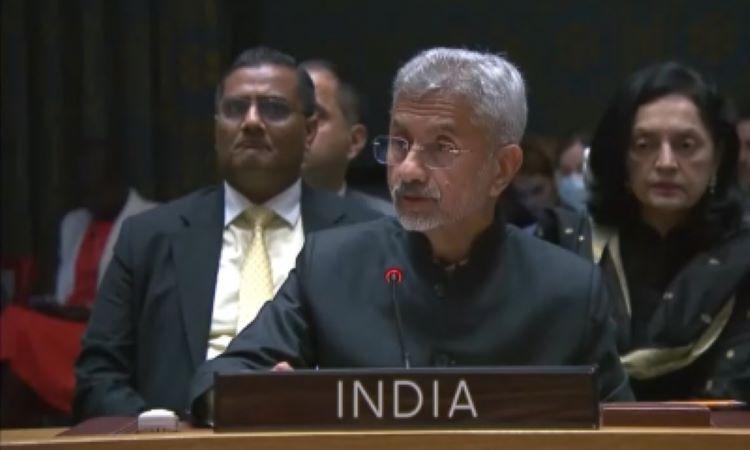"We will liberate ourselves from a colonial mindset," India's External Affairs Minister S. Jaishankar has said, proclaiming India's new agenda and laying out its global implications.
"Our rich civilisational heritage will be a source of pride and strength," he added on Saturday at the UN General Assembly.
As India celebrates the 75th anniversary of its Independence, he said the Indian people "are rejuvenating a society pillaged by centuries of foreign attacks and colonialism".
He attributed the "New India" that "is a confident and resurgent society" to "the visionary and dynamic leadership of Prime Minister Narendra Modi".
India's "age-old outlook," he added, "sees the world as one family. We believe that national good and global good can be entirely in harmony".
"Even as we meet our own development targets, India offers partnerships to our brothers and sisters in Asia, Africa and Latin America. And we do so based on their needs and priorities," he said.
Externally, leaving the colonial mindset means "reformed multilateralism and more contemporary global governance," Jaishankar added.
"We believe that multipolarity, rebalancing, fair globalisation and reformed multilateralism cannot be kept in abeyance," the External Affairs Minister said.
He added that a reformed multilateralism would have Security Council reforms at its core, pointing out that it has considerable support among UN members.
To reform the Council, "our call is to allow serious negotiations on such a critical matter to proceed sincerely. They must not be blocked by procedural tactics. Naysayers cannot hold the IGN process hostage in perpetuity," Jaishankar said.
The Intergovernmental Negotiations, or IGN as the reform process is known, has been blocked by a small group of countries led by Italy and includes Pakistan that has prevented the adoption of a negotiating text to allow the process move forward.
Also Read | China takes aim at Quad, also says no country should abuse power to bully others
Pitching India's case for a permanent seat, he added, "In these turbulent times, it is essential that the world listens to more voices of reason. And experiences more acts of goodwill. India is willing and able on both counts."
He said, "The world, as we knew it, is poised for transformational changes" having been impacted by a "succession of shocks" -- among them the Covid-19 pandemic, the Ukraine conflict and natural disasters.
Those politicising terrorism 'do so at their own peril', Jaishankar warns
India's External Affairs Minister S. Jaishankar called for 'zero tolerance' for terrorism and warned that those who prevent UN sanctions against terrorists "do so at their own peril".
"Having borne the brunt of cross-border terrorism for decades, India firmly advocates a a 'zero tolerance' approach," he said on Saturday at the high-level meeting of the UN General Assembly.
Without directly naming Pakistan or its protector China, he added, "Those who politicise the UNSC 1267 Sanctions regime, sometimes to the extent of defending proclaimed terrorists, do so at their own peril."
The UNSC 1267 Sanctions regime is the procedure for imposing sanctions based on the Security Council resolution with that number.
China has been blocking sanctions against Pakistan-based Lashkar-e-Taiba (LeT) leader Sajid Mir, involved in the 2008 Mumbai attacks, Jaish-e Mohammed (JEM) leader Abdul Rauf Azhar, and Jamaat-ud-Dawah (JuD) leader Abdul Rehman Makki.
Before relenting under international pressure, China had blocked sanctions against LeT leader Hafiz Muhammad Saeed, who is the mastermind of the 2008 Mumbai terrorist attack in which nearly 175 people died.
"There is no justification for any act of terrorism, regardless of motivation. And no rhetoric, however sanctimonious can ever cover-up blood stains," Jaishankar said.
He added, "Believe me, they advance neither their own interests nor indeed their reputation."


















